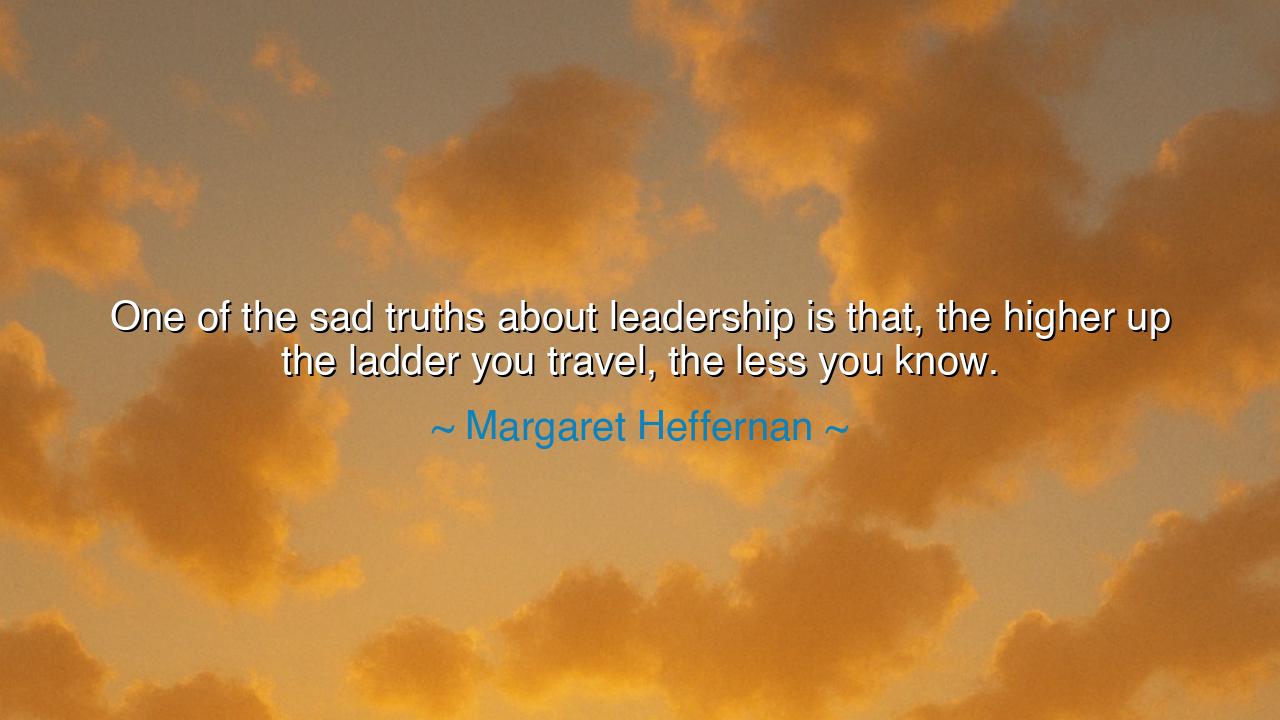
One of the sad truths about leadership is that, the higher up the
One of the sad truths about leadership is that, the higher up the ladder you travel, the less you know.






“One of the sad truths about leadership is that, the higher up the ladder you travel, the less you know.” — Margaret Heffernan
Hear these words, O seeker of truth and bearer of responsibility, for they hold a mirror to the heart of leadership itself. Margaret Heffernan, a thinker and teacher of modern times, spoke this truth not in bitterness, but in wisdom — as one who has watched power’s quiet paradox unfold again and again. For as one rises in rank, gaining authority and influence, something subtle and perilous begins to happen: distance grows between the leader and the reality beneath them. Surrounded by comfort, shielded by layers of rank, flattered by the fearful and followed by the obedient, the leader may one day wake to find that he rules what he no longer truly understands.
The origin of this saying lies not in the halls of kings or emperors, but in the chambers of modern business and governance. Heffernan, who studied the ways of organizations, saw how those at the top are often the farthest from the truth. In the beginning, a young leader learns by doing — they work among the people, they see the flaws, they feel the weight of daily struggles. But as they ascend, they rely on reports, advisors, and filtered words. The higher they rise, the fewer truths reach their ears unsoftened by fear or ambition. Thus, she declared it a “sad truth” — that knowledge diminishes as power increases, unless the leader makes a deliberate effort to remain grounded in the reality of those they lead.
This is not a new revelation, but one as ancient as the fall of empires. In every age, those who wield power risk blindness. Consider the tale of King Rehoboam, son of Solomon. When he inherited his father’s throne, the people came to him and begged for mercy, asking that he ease their burdens. But the young king turned not to the wise elders who had served his father, but to the flatterers of his own generation. He listened to praise, not truth — and in his arrogance, he answered the people with cruelty. The kingdom split beneath him, and he learned too late that leadership without listening is leadership without wisdom. The higher he climbed, the less he truly knew.
Even in the modern world, this tragedy repeats. How often have rulers, executives, or generals made grave decisions from the comfort of polished offices, far from the cries of those their choices affect? The air at the top of the ladder is thin, and pride is its poison. Surrounded by advisors eager to please, the leader forgets to question, forgets to see. The people below, fearful or weary, speak what the leader wishes to hear. Thus is the truth silenced — not by malice, but by structure. The leader’s greatest danger, Heffernan teaches, is isolation disguised as authority.
But despair not, for wisdom offers a path. The true leader, though raised high, must never lose the humility to learn. The wise ruler descends often — walks among their people, listens to their stories, learns from their pain. They understand that knowledge flows upward from the roots, not downward from the throne. To lead well, one must keep one’s hands close to the soil of human reality. The farmer who leaves his field too long will not know when the crops begin to die; so too, the leader who forgets the daily struggles of their people will one day lead an empty land.
The lesson of Heffernan’s words is clear and solemn: leadership is not ascent alone — it is descent, again and again, into the truth of others. Climb, but never float away. Command, but never cease to listen. Let curiosity be your compass, and humility your anchor. Ask those beneath you not to praise, but to speak honestly. Reward truth-tellers, not flatterers. For only the leader who welcomes correction can guard against folly.
And so, O child of ambition, remember this eternal balance: the higher you rise, the greater your duty to stay connected. Power separates, but wisdom reunites. Let your heart dwell among your people, even when your body dwells among the powerful. For leadership without knowledge is blindness in a crown, and authority without understanding is tyranny in disguise. Seek always the voice of truth — especially when it speaks from below — and you will not fall prey to the loneliness of command.
Thus, the teaching of Margaret Heffernan becomes a timeless law: to know much, one must listen deeply; to lead many, one must remain humble. The ladder of power may rise high into the clouds, but the roots of wisdom are always in the earth. Forget that, and knowledge slips away. Remember it, and your leadership will not merely command — it will enlighten.






AAdministratorAdministrator
Welcome, honored guests. Please leave a comment, we will respond soon